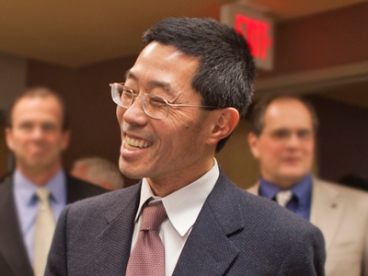Nov 20 2012
Kyocera Professor of Ceramics Yet-Ming Chiang, whose research has focused on the design of advanced inorganic materials and related devices, is the winner of this year’s Innovation Award in the category of energy and the environment for his breakthroughs in battery technology. The Innovation Awards are given annually by The Economist and sponsored in part by Huawei.
 Yet-Ming Chiang, the Kyocera Professor of Ceramics. Photo: Dominick Reuter
Yet-Ming Chiang, the Kyocera Professor of Ceramics. Photo: Dominick Reuter
After becoming the youngest tenured professor in the history of the Department of Material Sciences and Engineering in 1990, Chiang achieved a breakthrough in lithium-ion batteries that led to a new generation of batteries with unprecedented power, safety and life. His research has majorly impacted the transportation sector, as the global demand for lithium-ion automotive batteries continues to grow.
Chiang is a co-founder of A123, American Superconductor and his latest company, 24M Technologies, where he leads a team developing a groundbreaking design and manufacturing platform to provide high-energy rechargeable batteries at the lowest cost in the world. Currently more than 90 megawatts of installed grid-scale storage utilizes batteries with Chiang’s nanomaterials, with an additional 30 megawatts under contract.
“The Economist's Innovation Awards recognize the dreamers and the doers behind the innovations that transform the world we live in,” said Tom Standage, digital editor at The Economist and chairman of the 29-judge panel for the Innovation Awards. “Through their vision and creativity, this year’s winners have created important products and services. Whether in household names or behind-the-scenes breakthroughs, their innovative contributions have become part of everyday life for millions of people.”